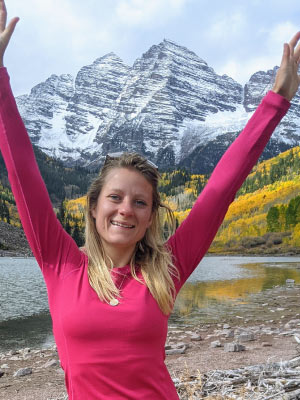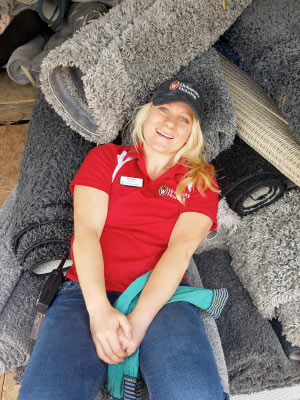
Every summer, typically at the start of August, downtown Madison’s sidewalks transform into junkyards — or, perhaps, thrift stores for the Hippie Christmas devout. The UW’s residence hall parking lots are no different. After all, who wants to lug that squeaky futon or grimy microwave back to Oshkosh or Naperville or wherever the freshman calls home? But this mindset left literally tens of thousands of pounds of junk on the campus streets, all destined for a landfill. Breana Nehls ’16 wouldn’t have it. While on campus, she came up with a plan to reduce some of that move-out waste. Some turned into nearly 100,000 pounds of waste annually through what is now known as University Housing’s Sustainability Move Out program.
Today, Nehls works as a program manager for the American Society of Adaptation Professionals, where she connects and supports climate professionals to build the field of adaptation. She always had a passion for the environment — growing up in Manitowoc, Wisconsin, she spent her free time exploring the shores of Lake Michigan with her friends. Even then, she realized the importance of fighting to protect the world around her. “If we want this to still be here for everyone to enjoy these experiences like we are, we have to protect it,” she remembers thinking. In a high school environmental studies class, she realized she could turn her interests into a career. “What I care about can be a job?” she thought. “That’s pretty cool!”
Nehls started her journey toward creating a more just, sustainable world at UW–Madison, but if she’s being honest, being a Badger had never been part of the plan. Her older sister was on campus, and Nehls wanted to carve her own path. “Plus, Madison was huge and scary!” she remembers. But she was awarded a scholarship she couldn’t refuse, and now, “when I look back,” she says. “I would never want to be anything but a Badger.”
Science Hall became her home as she majored in environmental studies and geography, the two programs that share the iconic building at the top of Langdon Street. In the Nelson Institute, she grew her understanding of how important the human and social aspect is to environmental work. Rebecca Ryan, Nelson’s distinguished undergraduate program coordinator, helped her pick a class called People and the Environment, where she learned “there’s this whole human connection and behavior element to all this. It really helped ground me in the human and social side of sustainability and the environment.”
As a sophomore, Nehls applied for and accepted an internship at the Office of Sustainability — “kind of on a whim,” she recalls. It was a good whim to ride — after graduation, she moved into a full-time position as the sustainability coordinator for University Housing. Her legacy of sustainability can be seen across campus today, from low-flow toilets to take-out containers to a truckload of used futons at Picnic Point.
A big part of Nehls’s day-to-day involved coordinating projects through the UW–Madison Green Fund, which supports student-initiated projects designed to decrease campus’s environmental footprint. She connected with Andrea Hicks — director of sustainability education and research, an associate professor in the Department of Civil and Environmental Engineering, and the Nelson Institute’s Hanson Family Fellow in Sustainability — and students in her Environmental Sustainability Engineering class who completed “toilet tours” throughout the residence halls. The students measured flow rates, determined which toilets needed upgrading, then connected with staff mechanics to move their recommendations forward. “It was a really good match,” Nehls says of pairing students with staffers, “and definitely living out the Wisconsin Idea of connecting the experience in the classroom out into the real world.”

Another Green Fund project that Nehls led was University Housing’s Ticket to Takeout program, which is still in use today. “To avoid single-use plastic, single-use Styrofoam, we did a study to decide what product would be best from a student perspective, for guests visiting campus, but then also on the back end: how it impacted dining staff who would have to clean these things,” she explains. Housing residents get a container at move-in, and students living off campus can buy into the program through the one-time purchase of a $5 token, which they trade for a reusable to-go container when picking up their food at the dining halls. Users get their token back after returning the containers to a drop box, where they are cleaned and put back into rotation by dining staff. “We got a campus improvement award for the Ticket to Takeout program,” Nehls says. “That was a really big accomplishment.”
In addition to receiving an award, Nehls also presented her work at conferences and published journal articles alongside Green Fund program manager, Ian Aley. “Bre sets people at ease, draws out the best in others, and offers confident and collaborative leadership,” Aley said of their work together, noting Nehls’ deep passion for sustainability. “She is a Nelson graduate worth celebrating!”
But perhaps Nehls’ biggest impact on campus — at least as far as sheer weight goes — was Sustainability Move Out. During the annual eight-day move-out period, 10 collection sites pop up across campus. Volunteers sort through the drop-offs, flagging things either for appropriate recycling or donation. Books go to St. Vincent de Paul. Nonperishable foods go to the Open Seat student food pantry. There’s even a special site for futon collection out at Picnic Point. “It was a really big undertaking involving partners throughout different departments at University Housing, across campus, and community partners,” Nehls says. “Each year, we were able to divert over 100 thousand pounds of material from the landfill.”
To get more peoplepower at the collection stations, Nehls once again turned to the students. She connected with professors who would offer credit to students for volunteering. On top of getting class credit, there was also a critical education component to working at the drop sites. “They were like, ‘Oh, there’s an option for me to not throw this away?’ ” Nehls explains. Having an alternative option was an introductory step for students to think critically about their sustainability habits.
Her connection with students gets back to Nehls’s earliest career aspirations: “I wanted to be a teacher when I was little,” she remembers. “Though I’ve never had a formal teacher role in a classroom, I feel like I’ve been able to connect with a lot of students and lifelong learners.” She’s proud to know that her efforts had a lasting impact on campus, but she’s even more proud when the students she’s worked with get that same feeling: “empowering students to really leverage the impact that they have on campus,” she says.
That space of empowering others to create sustainable solutions is the path Nehls sees for her career. “I always want to be in a position where I’m creating a space where people feel like they can continue to do this work,” she says. “It’s hard work. Whatever I can do to keep that light burning in them is what I want to do.”
Breana Nehls ’16 is one of six Nelson Institute alumni award winners. Their stories are featured throughout this magazine and online .